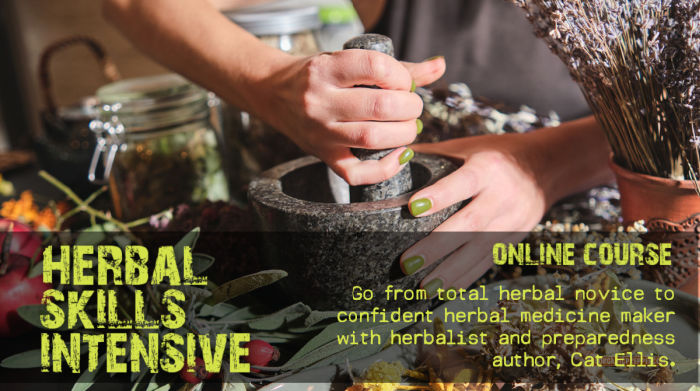
(Psst: The FTC wants me to remind you that this website contains affiliate links. That means if you make a purchase from a link you click on, I might receive a small commission. This does not increase the price you’ll pay for that item nor does it decrease the awesomeness of the item. ~ Daisy)
Pregnancy can be a huge issue in the best of times! When times get hard, it’s even more so. Some say that a pregnant woman is “in a delicate condition” with good reason. Her body has changed to accommodate the needs of the child growing inside of her womb. She’s eating for two (or more) and all of the things that go with that. And I’ve yet to meet a pregnant woman who could find a comfortable position after a few months!
There’s good reason that obstetric care is an absolute must, even in the worst of times. So how can herbal medicine help? What should you know about using herbs during pregnancy, and most importantly, what herbs are contraindicated? Read on!
In this article, I’ll discuss some herbal options along with any available scientific bases. The references I’m using, as before, are Cat Ellis’s Prepper’s Natural Medicine, The Green Pharmacy by James Duke, and Brigitte Mars’ Natural First Aid Handbook.
But first, to keep the FDA happy, the Disclaimer: We no doctors here! We no give medical advice! Reader do own research and make own choices! If you’re in distress you go nearest ER! Always consult a doctor before using any remedy, especially during pregnancy!
Nutritional herbs during pregnancy
Ellis points out, among other things, the necessity of good nutrition at all stages of pregnancy. Pretty much the entire scientific community, from Medline to Johns Hopkins, agrees with this. Remember: the pregnant woman is eating for two or more. In order to maintain her own health and the health of the developing child(ren), the importance of a healthy diet cannot be overemphasized. And not that processed crap, either! Fresh, whole foods from all of the basic food groups are necessary here. Mayo Clinic gives pregnancy dietary guidelines here, along with a variety of nutrient sources.
Ellis gives great recipes on pages 191-193 that include red raspberry leaves, nettle, and oat tops or oat straw. The yellow dock recipe contains molasses and, not surprisingly, yellow dock.
Ellis’s Healthy Momma tea is billed as an overall benefit. According to Healthline, red raspberry leaves are loaded with nutrients, most notably antioxidants. Evidently, midwives have been using this for centuries. Healthline relates evidence that this may help shorten labor as well as reduce the need for birthing interventions. They also cover nettle, which contains anti-inflammatories along with several vitamins, minerals, and antioxidants. Healthline does urge caution however, since nettle can induce contractions. This can be a good thing later in pregnancy. Earlier on, not so much.
Oat straw is a bit more difficult to find scientific evidence on. What I did find on PubMed urges caution with a number of herbs, and caution is not a bad thing. This blog, however, gives an herbal tea very similar to Ellis’s recipe, along with information on a few more.
Nausea-reducing herbs during pregnancy
One great thing about pregnancy is the nausea. Many a mother-to-be has spent serious time at the porcelain altar due to morning sickness! Ellis suggests ginger for this, citing excess estrogen as the underlying cause of the nausea. Healthline supports this citing many studies in support of this benefit. Both they and Ellis suggest candied ginger, which is easy to carry.
Yellow dock is a bit more problematic, according to RxList, calling it likely unsafe in both pregnancy and breastfeeding. They cite the chemical’s laxative effects, which may not be desirable during pregnancy and can be transferred via breast milk. The American Pregnancy Society lists a number of herbs used in pregnancy along with safety ratings, noting both yellow dock and stinging nettle as likely unsafe.
Duke has interesting things to say about ginger, including the opinion of one pharmacologist that it may induce miscarriage. He also says he’ll continue to use it until more evidence exists to say otherwise, having noted its efficacy firsthand. According to him, the effect is highly dosage-dependent. He says that it takes less than 1 gram of ginger to control morning sickness. The Chinese would use 20-28 grams to induce menstruation and possibly abortion. With the average strong tea containing about 250 milligrams of ginger, that’s well below the amount necessary to induce miscarriage. He also mentions raspberry and peppermint, among others, in his herbal pregnancy formulary.
Threatened miscarriage
Mars suggests black haw to maintain a pregnancy during a threatened miscarriage. She also bills it as a uterine sedative with the ability to strengthen the wall of a weak cervix, suggesting one drop of tincture every two hours for 2-3 days. She specifically says waking hours, so there’s no need to set the alarm! Sleep is good, especially during pregnancy. RxList gives black haw as possibly unsafe during pregnancy since it may affect the uterus. Not enough information is known about using black haw during breastfeeding.
Some herbs to be cautious of during pregnancy
So there are a few herbs that, used with caution, can help maintain a safe pregnancy. What about herbs that are safe for other uses but contraindicated during pregnancy and breastfeeding? That’s a long list so please take note. Duke quotes Deb Soule, author of The Roots of Healing, suggesting avoidance of barberry root, peppermint, feverfew, cascara sagrada, juniper berries, mugwort, pennyroyal, poke root, rue, senna, tansy, thuja, and wormwood. He suggests that dill can cause problems in medicinal amounts, so use in moderation.
Fenugreek and fennel are estrogenic herbs that can be used in breast enlargement, but fennel can also cause miscarriage. Also, Ellis notes that morning sickness is caused by excess estrogen. Estrogenic herbs might not be the best choice during pregnancy.
Duke also recommends against St John’s wort while pregnant. Some research suggests that this herb can cause birth defects, but this systematic literature review on PubMed doesn’t find much evidence of this.
Caution is always a good thing until more data appears. It’s interesting that Duke advises against large amounts of peppermint on pages 410-411 but does list it as effective in morning sickness on pages 400-401. I believe that quantity is the key issue here.
The list of herbs contraindicated in pregnancy is quite lengthy, probably several articles worth. The University of Texas gives a good list here. Beth Israel Lahey Health gives a list here and the American Pregnancy Association gives a list here. Again, these lists are lengthy. I recommend printing them out since the Internet may not always be available. A good herbal course, like ours here, can also help.
Learn what you can well before you need the information.
This is not the kind of thing we want to learn the hard way once SHTF! And one does not typically study well when one’s wife is in labor. This is definitely something we want to learn before we need it!
Have you used herbal medicines to maintain a healthy pregnancy? Do you have any cautions or recommendations? Any personal stories? Please tell us in the comments section!
About Amy Allen
Amy Allen is a professional bookworm and student of Life, the Universe, and Everything. She’s also a Master Gardener with a BS in biology, and has been growing food on her small urban lot since 2010.


